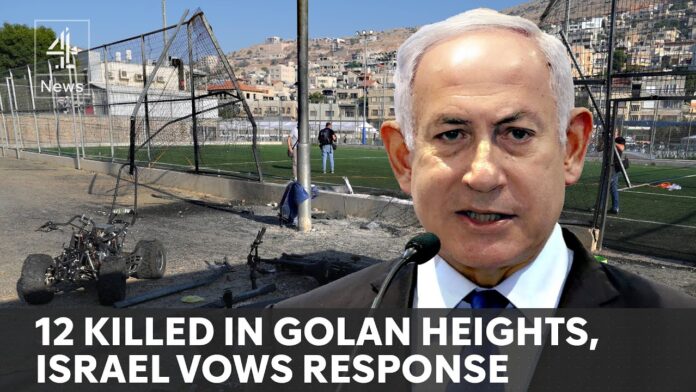Deadly rocket attack kills 12 children in Israel, intensifying cross-border conflict and prompting fears of a broader confrontation
A rocket strike on a football field in the Israeli-occupied Golan Heights has escalated tensions between Israel and Hezbollah, bringing them to the brink of a full-scale war. The attack, which killed 12 children and teenagers, marks the deadliest cross-border incident since hostilities between the two sides intensified in October 2023.
Following the attack, the University of Haifa, located less than 50 km from the border, has taken precautionary measures, advising staff based above the fifth floor to work from home due to fears of further Hezbollah rocket strikes. The incident has heightened anxiety among residents and prompted increased security measures across northern Israel.
Since October 2023, cross-border exchanges between Israel and Hezbollah have become increasingly frequent. Hezbollah’s rocket attacks on Israeli positions were initially in response to an assault by Hamas on Israel. These exchanges have resulted in over 450 deaths in Lebanon—about 100 of them civilians—and 40 deaths in Israel, including both civilians and soldiers.
The recent rocket attack represents the largest single loss of life in these cross-border skirmishes. In response, Israel has conducted airstrikes on southern Lebanon, while Hezbollah has reportedly cleared key sites in anticipation of further Israeli retaliation.
Israeli Prime Minister Benjamin Netanyahu, who returned early from a visit to the US, has promised a severe response to Hezbollah. Foreign Minister Israel Katz has called for Hezbollah’s leader, Hassan Nasrallah, to face serious consequences, and Finance Minister Bezalel Smotrich has warned that Israel is edging closer to all-out war.
The potential for a broader conflict is compounded by Hezbollah’s significant military capabilities, including an estimated 150,000 rockets and missiles, and its role as a key proxy for Iran in the region. Iran has cautioned Israel against further military actions in Lebanon, warning of potential severe repercussions.
Meanwhile, the Israeli government faces internal pressures, with many citizens displaced from the border region demanding decisive action against Hezbollah. Netanyahu, grappling with declining popularity and political challenges, may be tempted to escalate the conflict as a means of bolstering his position domestically.
As the situation remains volatile, international calls for restraint are growing, with the region poised on the edge of a potentially devastating conflict.
Analysis
Political Perspective The escalation between Israel and Hezbollah highlights the complexities of Middle Eastern geopolitics. Hezbollah’s role as an Iranian proxy adds a layer of international tension, and Israel’s response to the rocket attack is as much a domestic political manoeuvre as it is a strategic military decision. Netanyahu’s handling of the situation may influence his political future, reflecting the interplay between domestic pressures and foreign policy.
Social Perspective The rocket attack has had a profound impact on Israeli society, particularly on residents of the Golan Heights and northern Israel. The death of children in the attack has intensified fears and uncertainties among the population. The response from local communities, including increased security measures and public mourning, underscores the social toll of the ongoing conflict.
Economic Perspective The possibility of a broader conflict with Hezbollah could have significant economic implications for both Israel and Lebanon. Increased military operations may strain Israel’s resources, which are already stretched thin due to ongoing conflicts in Gaza. The economic impact on Lebanon could be severe, exacerbating the country’s existing economic challenges and further destabilizing the region.
Gender Perspective The rocket attack and the potential for further conflict impact all genders, but the focus on the death of children highlights the broader human cost of war. Gender dynamics within the affected communities, including the role of women in supporting displaced families and managing security, will be crucial in understanding the full societal impact.
Racial Perspective The ethnic and national identities of those affected by the conflict—Israeli Jews and Lebanese Arabs—play a role in shaping perceptions and reactions to the violence. The historical and ongoing tensions between these groups contribute to the broader context of the conflict, influencing both domestic and international responses.
